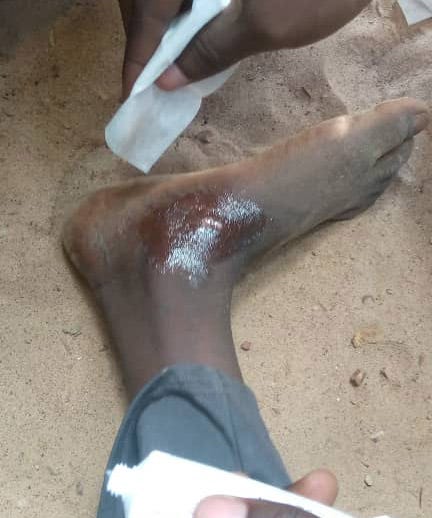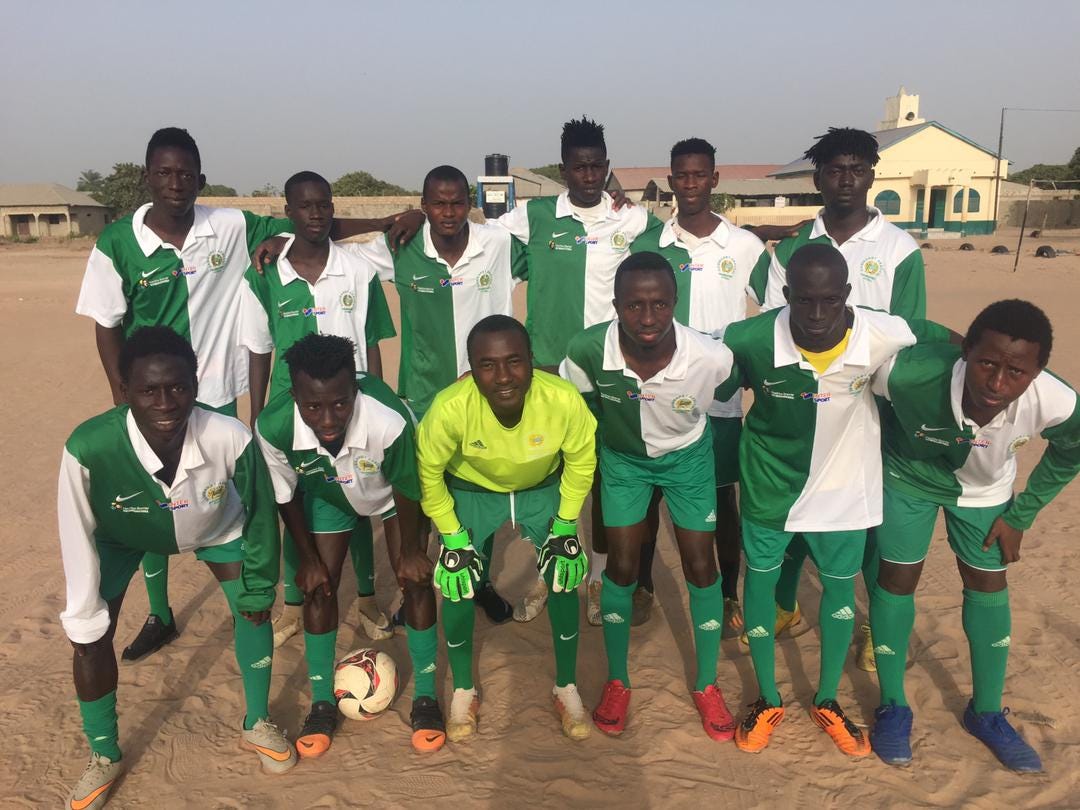Football
Family update: Patrick’s Granny died last Tuesday after about a week’s illness. She’d suffered with asthma for who knows how long, and on a couple occasions over the past year there have been periodic lacunae in my ongoing conversations with Patrick—the hallmark of a more serious bout with the condition which predicated major family crises and trips to the clinic. This one was three days long and ended with a short voice message in which Patrick told me that the doctor informed him she would die without a lung transplant.
The Gambia being exactly the kind of raw, untempered capitalist society some folks think they want to live in, a lung transplant can only be had for some dizzying sum of money that neither Patrick nor I possess, and so Granny’s fate was sealed.
She wasn’t really his granny. She was an adoptee—a friend of his father’s who took over care of the family after Patrick’s parents died. Gradually, over the decade since, Patrick became the de facto head and cared more for her than the other way around, I think, though if asked he might deny that was the case. She was still a mentor for him though, and I’m sure the house is a much emptier place without her.
She was a shadowy figure in my conversations with Patrick—she didn’t want her photograph taken and could not speak any English, so all I know of her comes from him. He tells me though, that she would often sit and watch him communicate with me, and when I would drudge up big gobs of information from the Google machine she would tell him I had magic. I liked her in much the way one likes a literary character; as much a product of imagination as fact.
Communication with Patrick continues to be difficult given the water damage to his phone. We pass a handful of short voice messages back and forth throughout the day, but honestly I have a difficult time getting much out of them; Patrick’s accent is thick, his voice is very low, and there’s generally some sort of commotion going on in the background, so I don’t always catch everything he’s saying. His new phone—purchased with funds earned through this blog—is winging its way across the Atlantic as I write these words. Who says writers can’t earn a living?
Fortunately I have quite a bit of Patrick’s writing in the can, as it were, and rather than dwell on the struggles of the present I thought it would be best to open a window onto those skills that truly set him apart. His facility with language and his ability to make connections with disparate groups of people are of course the very skills that bring us his voice, as he was able to use those skills to make a connection to yours truly. Combined with a natural affinity for teaching and the love of soccer which is apparently as endemic to the continent as it is to Europe, he makes a superb youth soccer coach, and though he’s not doing it now in Kerr Amadou, I know he’s pining for a return to Brikama and the kids he so enjoyed teaching there.
Atlanta Fans Club is a soccer team consisting of players below fifteen years old. The goal is to provide instruction in soccer to these talented young boys, moreover to teach morals and norms. We hold every session in Brikama Nilakoto, which is a small village to the west of Brikama, in the state of Jamisa. I am the coach of the football team. We name it Atlanta to spread our love and unity to our loved ones in Atlanta—the Moore family. My priorities are to teach and train these promising young talented boys the basic skills in soccer, for example breaking with the ball, shooting, and passing. Atlanta is a very diverse team I embrace it deeply in my heart and personality. Being their trainer and coach I am gifted with the talent to be able to speak and understand different local languages. I am fluent in Mandinka, Jola, Fula, Wollof, and Manjago. With this ability I am able to make communication with them easier.
Our team consists of kids from six different tribes each with different cultures and traditions, but we come under one umbrella during sessions which spread love and kindness. Some members are in school and understand English while others stay at home due to their family situation. Usually every month we play two test games with neighboring teams. It is always fun and a great joy to watch. In total we have twenty members but not all appear all the time for training sessions or on match days.
Click here to see Patrick’s kids in action in Brikama.
Team members they are assigned positions based on their abilities and the best in each position are selected to represent the team in competition. During game days we come to my home a few hours before. Juice is served and then team talks begin, starting with my assistance and then to our captain or leader on the football field. We encourage love and patience during the game by showing discipline. I am usually the last to speak, and I give the game plan and how we can end with victory. From there we give the floor to players to speak out their opinions which might help the team. We won two of our last few games but were defeated at the third. Other teams that we played are Blue Stars Fans Club and Upright Boys. We have only one football jersey, unlike teams with pairs of football jerseys. Our captain is called Tumbaye Jarju and our vice captain is called Maleng Camara.
The detail here that catches my attention—indeed it was the first indication I had a year or so ago when we started corresponding that Patrick was an unusual person—is his somewhat nonchalant listing of the tribal languages he speaks. He’s proud of his language ability (he also knows a bit of French and even a smattering of German), and rightly so, as this degree of multi-language fluency is not common even in multi-tribal Gambia. Moreover, these are not like dialects of the same language—there are in fact, dialects within these languages that are not mutually intelligible. Mandinka, the most widely-spoken tribal language in The Gambia, is, moreover, a tonal language, where Wolof, Fula, Jola, and Manjago are not. Did you have trouble in high school with the two gender system of Spanish? Thank Dios you didn’t have to learn Fula, with its 24 distinct classes of nouns.
So no easy task, mastering half a dozen distinct languages. Patrick and I talked about this a bit around the beginning of July:
Patrick: Atlanta United played against Blue Stars this morning. That's where the boy had the injury. It requires endurance being with kids especially the stubborn ones. Also some among them are leaders and others are gifted with creativity.

Fletch: Are they from all different tribes?
Patrick: The team consists of six tribes and I love their interactions with each other.
Fletch: That’s interesting. Do they have any difficulty communicating? How can you tell what tribe a person is from?
Patrick: Oh yes am just lucky I understand and can speak all the languages of the tribes I have on my team. The only way you can tell is by knowing the surname of someone or recognize the language he or she speaks.
Fletch: Do they have trouble understanding one another at all?
Patrick: Oh no almost all of them can speak Mandinka which is the most widely spoken language in The Gambia. And some of them speak English too. But for better understanding I speak to them individually their local language.






